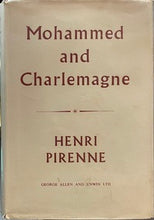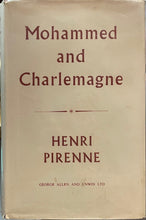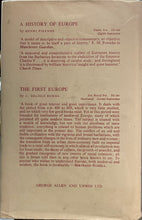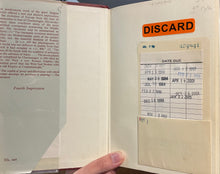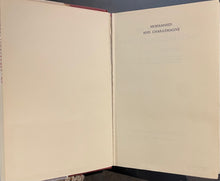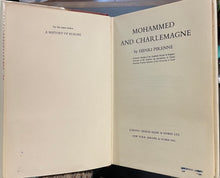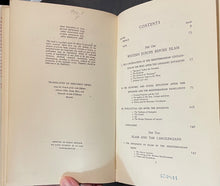
Mohammed and Charlemagne, a historical treatise, was written by Belgian medievalist and public intellectual Henri Pirenne (1862-1935). Focusing on the period of European History between the fifth and ninth centuries, Pirenne took up the daunting task of writing in opposition to the prevailing view on the end of the Roman Empire. Rather than focusing on the invading hordes of Germanic barbarians to whom the Fall of Rome is generally attributed, Pirenne’s proposed a map of history where the shape of European society from the Roman Empire to the Dark Ages and the eventually the Carolingians is determined by the Muslim conquest of North Africa.
“This was the crowning achievement of his last years of work. The problem of the end of Antiquity and the beginning of the Middle Ages had always preoccupied him. Before the War, in his lectures on the History of the Middle Ages, he drew attention to the profound traces which the institutions of the late Roman Empire had left upon those of the Frankish epoch. But it was during his captivity in Germany, when, as a prisoner in the camp Holzminden, he organized for the many Russian students who shared his fate, a course of lectures on the economic history of Europe, that the solution of this capital problem seems to have dawned upon him. And during his exile in the village of Kreuzburg, in Thuringia, while he was writing his History of Europe, he emphasized, for the first time, the close relation that existed between the conquest of Islam and the formation of the mediaeval Occident” (from the Preface by Jacques Pirenne, p.9)
Although he clearly poured a great deal of thought and work into this writing, Henri Pirenne did not live to see it published. Jacques Pirenne, the historian’s son, partnered with one of the historian’s former students to edit his father’s manuscript for publication. The first edition was published in French, Mohammed et Charlemagne (1937). The monograph went on to become incredibly influential in the way that history is taught and conceived, and Pirenne’s argument concerning the influences of Arab expansion on the evolution of European society has come to be known simply as the “Pirenne Thesis.” This edition is the fourth impression of the English translation by Bernard Miall, itself taken from the 10th French edition.
"Without Islam, the Frankish Empire would have probably never existed, and Charlemagne, without Muhammad, would be inconceivable." – Henri Pirenne
- Title: Mohammed and Charlemagne
- Author: Henri Pirenne
- Publisher: George Allen and Unwin Ltd.
- Place: London
- Year: 1965
- Editors: Jacques Pirenne and F. Vercauteren
- Translator: Bernard Miall
- Printer: John Dickens & Co. Ltd.
- Fourth Impression
- Language: English
- Length: 293pp
- Dimensions: 6” x 8.75”
- Condition: Red cloth covered boards. The paper jacket is tanned with age but intact under a clear protective library covering. The red dye from the cover has bled somewhat into the top edges of the text block, perhaps from water damage. The library slip and pocket are still within. A Greenwich Library stamp sits on title page. The pages are mostly clean, but there is underlining and/or notation in pencil on pages 156-57, 265-59, 271, 190-91. There are small top corner folds on 271 and 273 and a small fold and tear on the bottom of p.236. The binding is coming slightly loose. It is mostly intact but there is a fracture between the front endpapers and the main block.








